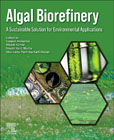
Algal Biorefinery: A Sustainable Solution for Environmental Applications
Mehariya, Sanjeet
Kumar, Bikash
Bhatia, Shashi Kant
Karthikeyan, Obulisamy Parthiba
Algal Biorefinery: A Sustainable Solution for Environmental Applications focuses on the possibilities, assets, and functions of algae as a renewable and sustainable resource that can act as an excellent alternative able to withstand adverse environmental conditions to generate useful products. Thus, apart from helping in reducing environmental pollution and carbon footprint, algae can help in mitigating factors causing rapid climate change via concurrent bioremediation, resource recovery, and achieving environmental sustainability. This comprehensive book examines dedicated, state-of-the-art information on the topic of how algae can act as a cushion against climate change. In addition, it explains how algal-based biorefineries can act as a potential solution to climate change, lack of natural resources, and environmental pollution. Examines the environmental impact assessment of existing and developing algal- based technologies for future environmental sustainabilityOffers up-to-date information in algal-based wastewater treatment and resource recovery to assist in climate changeProvides flow charts, schematic diagrams, and figures showing mechanisms and processes for the depiction of strategies for algal-based technologies INDICE: 1. Characteristics of waste and their treatment via algal technologies with special emphasis on current status and prospects in environmental remediation and acclimatizing to changing climate. 2. Understanding carbon emission and minimizing carbon footprint via algal biomass based biorefinery technologies i.e., Algal biomass-based carbon sequestrations and its impacts on environment conservation. 3. Potential of Algae from marine sources for future largescale application to meet food, feed and environmental sustainability issues. 4. Advances in technologies for biotransformation of algal biomass into high value products. 5. Algae as potential source of biofuels Biodiesel, biofertilizers, biochar food, feed, metabolites and medicine etc., utilizing global temperature rise and carbon emission as potential substrate and energy source etc 6. Wastewater treatment via Biotechnological advances for utilization of algae, microalgae and cyanobacteria for wastewater treatment and resource recovery 7. Role of algal based technologies for bioremediation of pharma wastes from wastewater streams of pharmaceuticals industries. 8. Role of algal based technologies in domestic wastewater treatment for resources recovery and water reuse 9. Role of advanced modeling techniques for development of highly efficient phycology-based technologies and better understanding of mechanism and kinetics of algal based bioremediations 10. Bottlenecks in the algal based technologies in the path of industrial commercialization and application in environmental protection 11. Algal biomass as potential source of food, feed medicine utilizing global temperature rise and carbon emission as potential substrate and energy source. 12. Bottlenecks and opportunities towards practical aspects of microalgae-based biorefineries 13. Future prospect of development of integrated wastewater and algal biorefineries and its impact on biodiversity and environment 14. Life cycle assessment and technoeconomic sustainability assessment of existing algal based technologies for future implications 15. Environmental Impact Assessment of developed and developing algal based technologies for future sustainability
- ISBN: 978-0-443-23967-0
- Editorial: Elsevier
- Encuadernacion: Rústica
- Páginas: 350
- Fecha Publicación: 01/02/2025
- Nº Volúmenes: 1
- Idioma: Inglés
